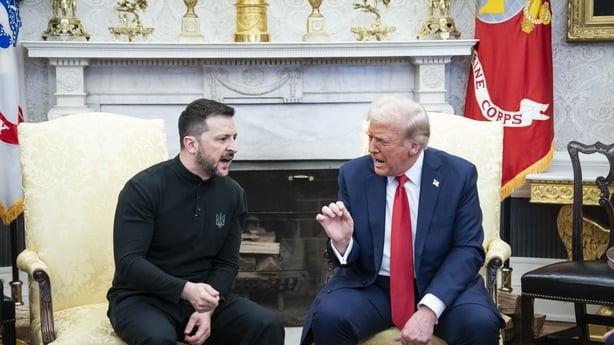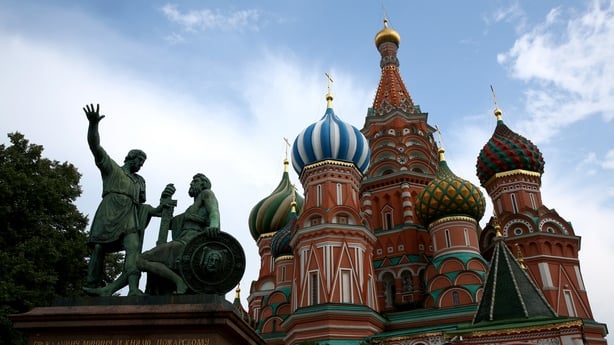There is concern in Moscow that US President Donald Trump could turn on Russia, according to an Irishman who has lived there for close to three decades.
Chris Weafer hails from Mullingar in Co Westmeath and is CEO of strategic consulting firm Macro-Advisory.
Prior to helping large companies navigate the Russian market, Mr Weafer held positions at financial institutions across Eurasia.
"I think people understand that President Trump can easily do a 180 with regard to Russia," he said.
His comments come in light of the recent meeting in the White House between US President Donald Trump and Ukraine's President Volodymyr Zelensky earlier this month.

In the days that followed that meeting, European states - including Ireland - pledged their support for Ukraine in what is seen as a widening rift across the Atlantic.
The European Union has since announced a new defence plan - ReArm Europe - to help protect the continent.
The EU's 27 member states are expected to give a green light to the defence plans, based largely on freeing states to spend much more - something France and Germany look set to do.
Mr Weafer told Katie Hannon on Upfront: The Podcast this week that there has been very little coverage of the recent Oval Office summit between President Trump and President Zelensky.
"It is notable that there has been no kind of official comment from Putin or from the Kremlin about anything that's been happening recently," Mr Weafer said.
Watch: Upfront with Katie Hannon's discussion on Ukraine and Gaza
"You are getting a restatement of government position from Foreign Minister (Sergey) Lavrov, who essentially keeps saying, 'we want a broad peace deal' that deals with the root causes as they see it, but this is just restating what we've known.
"There's been no kind of reaction to the recent events in the White House or what's happening with Europe. They're staying quiet on that, at least for now."
'Friend today, enemy tomorrow'
Mr Weafer said there are also concerns in Russia that President Trump could do a "180" and turn his back on Moscow.
"It is not a case that everybody is kind of jubilant, this is great, he's on Russia's side," he said.
"They certainly acknowledge the fact that Trump’s 'Make America Great Again' (policy) is very pro-America, and whatever he needs to do to strengthen the US position, he will do.
"He could be your friend today and your enemy tomorrow - they all understand that, and they see this behaviour as kind of reinforcing that."

Mr Weafer said there is also a "strong narrative in Russia amongst officials" that President Trump is doing what he said he would do.
However, Mr Weafer says there is concern in Russia that if the country does not cooperate, Washington will make things worse for them.
"In Moscow this really has been heard loudly: that if you don't cooperate, sanctions will get a lot worse," he said.
"They do fear that because right now the economy has adapted, but the pressures on the financial sector and on the banks is affecting cross-border trade - in other words, the ability of Russia to be paid for its exports and to be able to continue to buy goods and products."
What next for Ukraine?
Mr Weafer said Ukrainian territory seized by Russia during the invasion is likely on the chopping block to keep Russia on-side if a peace deal is reached, following a private meeting between officials in Saudi Arabia on 18 February.
"It is generally believed that that private meeting was all about the US saying to Russia, 'you work with us on China and Iran, and then we can make the peace process go faster'," Mr Weafer said.
"My interpretation of what I'm hearing both on Washington's side and on the Russian side of that is that there is a sense that Ukraine will be forced into accepting peace deals that, as President Zelensky said, were unacceptable," he added.
We need your consent to load this rte-player contentWe use rte-player to manage extra content that can set cookies on your device and collect data about your activity. Please review their details and accept them to load the content.Manage Preferences
"The main one will probably be with regard to territorial concessions."
Mr Weafer said he believes it could be a similar set up to Turkey and Cyprus, with de-facto recognition by Russia over disputed territory in eastern Ukraine.
"In other words, probably there won't be any push for international recognition of Russia's sovereignty over east Ukraine - but there will be de-facto recognition in exactly the same way as maybe Turkey does not have ownership of north Cyprus, but de-facto it has. That's the model."
Mr Weafer says he believes Ukraine will now likely "be forced" to accept such a situation as part of a peace deal.
China
Mr Weafer said there are larger geopolitical forces at work here with China being a bigger factor in President Trump's plans than people may realise.
He said the US has concerns about Russia moving closer to China as sanctions take hold.
"Russia trade with China is expanded - they're giving discounted oil and buying cars," he said.
"There's a real fear in Washington that if Moscow is pushed too far [on Ukraine], then it'll start to transfer some of the scary military technology - like stealth submarines or hyper fast missiles - to China.
"The US does not want Russia to help China develop its nuclear program."
Mr Weafer said the US expressed its concerns around China to Russia during the private meeting in Riyadh last month.
"It is believed that Washington said to Russia that it does not want to see Russia cooperating with China."
He said Mr Trump’s approach will likely come at the expense of Ukraine.
"He's willing to cut a deal with Russia at the expense of Ukraine in order that he can then move on to his main agenda."
Mr Weafer said Iran is also a factor in Mr Trump’s plans and there have been discussions around Iran to contain its nuclear program too.
Trump factor
Mr Weafer said Russia wants to go to the negotiating table with President Trump being a big factor.
"They definitely feel that there's momentum on their side," he said.
"I think if it wasn't for Donald Trump factor, they probably would delay and delay and delay because they are making progress [in Ukraine].
"But the Trump factor is important because Trump is in a hurry."
On the other side Mr Weafer said Russia wants to make a deal for economic reasons.
"Sanctions relief is important for Russia - really, there is a great deal of war fatigue," he said.
"There are some major problems in the Russian economy - like the declining labour demographics, the fact that Russia is so dependent on importing technology and infrastructure improvements - all of which have been delayed. It needs to get back to these."
Mr Weafer said while Europe moves to take a bigger role in its own defence, any change will likely take a long time to come into force.
"The Russian position up to relatively recently has been that there is no point in negotiating with Europe, that you have to negotiate with Washington because Washington controls everything," he said.
"I guess they assume that Europe will do what Washington tells them - there's now question marks over that."
A stronger Europe
Mr Weafer said officials in power in Moscow would likely grapple with a stronger Europe.
"As a European, I'm very glad to see it, finally – there is some sense that maybe Europe might try to stand on its own two feet and become more independent," he said.
"There is more of a debate about how Russia should re-engage with Europe, but it is over the next couple of years rather than the next couple of weeks or months.
"I think there's a lot of head-scratching probably taking place in Moscow now as to how to deal with Europe - but for now, I think the priority will be to do a deal with Trump because the reality is Europe is not strong enough yet to substitute the US."
Mr Weafer believes if Europe does "everything they say they want to do, it'll take several years to get to that point."
Listen to Chris Weafer speaking to Katie Hannon on Upfront: The Podcast here, on Apple Podcasts and on Spotify.
Watch Upfront with Katie Hannon on Monday at 10.35pm on RTÉ One and the RTÉ Player.

